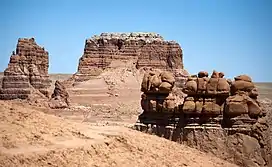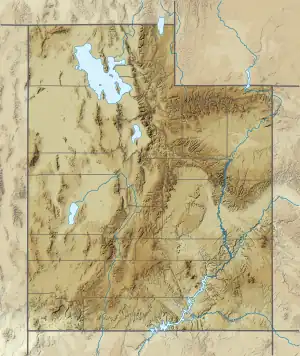| Mollys Castle | |
|---|---|
 Mollys Castle | |
| Highest point | |
| Elevation | 5,265 ft (1,605 m)[1] |
| Prominence | 365 ft (111 m)[1] |
| Parent peak | Wild Horse Butte (5,760 ft}[1] |
| Isolation | 2.08 mi (3.35 km)[1] |
| Coordinates | 38°34′36″N 110°40′51″W / 38.5766442°N 110.6807077°W[2] |
| Geography | |
 Mollys Castle Location of Mollys Castle in Utah  Mollys Castle Mollys Castle (the United States) | |
| Location | Emery County, Utah, U.S. |
| Parent range | Colorado Plateau |
| Topo map | USGS Goblin Valley |
| Geology | |
| Age of rock | Jurassic |
| Type of rock | sandstone |
Mollys Castle is a remote 5,265-foot (1,605-meter) elevation summit located near Goblin Valley State Park, in Emery County, Utah.[2] Mollys Castle is situated 2.3 mi (3.7 km) east of Wild Horse Butte, and one-half mile outside the park's east boundary. The top of this magnificent butte rises 265 feet above its surrounding terrain.[3] Precipitation runoff from Mollys Castle enters the Colorado River drainage basin.
Geology
Mollys Castle is a geological feature set within the San Rafael Desert on the southeastern edge of the San Rafael Swell. This erosional remnant is composed of Jurassic rock. The thin, light-colored layer on top is Curtis Formation caprock, overlaying darker, reddish Entrada Sandstone, which is also the composition of the hoodoos that give Goblin Valley its name.[4][5]
Climate
Spring and fall are the most favorable seasons to visit Mollys Castle. According to the Köppen climate classification system, it is located in a Cold semi-arid climate zone, which is defined by the coldest month having an average mean temperature below −0 °C (32 °F) and at least 50% of the total annual precipitation being received during the spring and summer.[6] This desert climate receives less than 10 inches (250 millimetres) of annual rainfall, and snowfall is generally light during the winter.
Gallery
See also
References
- 1 2 3 4 "Mollys Castle - 5,265' UT". listsofjohn.com. Retrieved 2020-11-10.
- 1 2 "Mollys Castle". Geographic Names Information System. United States Geological Survey, United States Department of the Interior. Retrieved 2020-11-10.
- ↑ National Geographic Guide to the State Parks of the United States, National Geographic Society (U.S.), 2008, page 300.
- ↑ Mark Milligan (1999). "The Geology of Goblin Valley State Park" (PDF). Utah GeologicSurvey. p. 7-13. Retrieved November 10, 2020.
- ↑ J. Keith Rigby, Northern Colorado Plateau: Field Guide, 1976, page 150.
- ↑ Peel, M. C.; Finlayson, B. L.; McMahon, T. A. (2007). "Updated world map of the Köppen−Geiger climate classification". Hydrol. Earth Syst. Sci. 11. ISSN 1027-5606.
External links
- Mollys Castle: weather forecast

